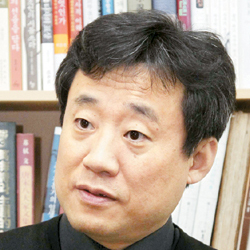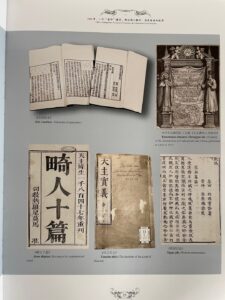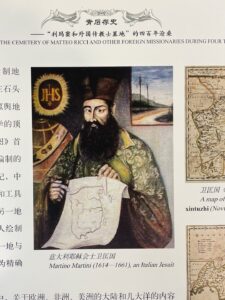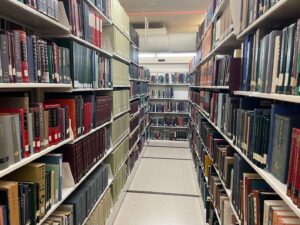 We spoke with Prof. Jung Min (Hanyang University) to learn about the materials he is using to carry out his research on “The Contact and Acceptance of Korean Intellectuals to Catholicism through Western Missionaries’ writings”
We spoke with Prof. Jung Min (Hanyang University) to learn about the materials he is using to carry out his research on “The Contact and Acceptance of Korean Intellectuals to Catholicism through Western Missionaries’ writings”
Could you briefly introduce your research project at HYI?
My research focuses on the impact of books written by Jesuit missionaries in Chinese texts in the 16th and 17th centuries during the influx of Catholicism into Korea in the late 18th century. Two years ago, when I published a translation of The Seven Victories (七克) by Pantoja (1571-1618), a Jesuit missionary from Spain, I realized that a deeper understanding of various religious books and their activities, especially written by Western missionaries, is essential, and the influence of Joseon intellectuals on them is not simple.
Studies on the history of the Catholic Church in Korea have not paid attention to this part, and research on this has remained at a rudimentary level. This is because Korean church history researchers have focused on the persecution the church has received from the state and the religious life of individual martyrs.
Here I review the work of researchers in China, the United States, and Europe, and gather and organize the relevant basic data, which will be a great stepping stone to my research and translation work going forward.
What materials in the Harvard-Yenching Library have been especially helpful for you?
 The Yenching Library never fails to disappoint researchers, and because it’s full of unexpected material, it feels like a daily treasure hunt in the library. These are mostly things that are not available in Korea. At the same time, I continue to do research at the Ricci Institute at Boston College. The data of the two libraries is synergistic, and the interest of research and the pile of data are growing as the vine grows.
The Yenching Library never fails to disappoint researchers, and because it’s full of unexpected material, it feels like a daily treasure hunt in the library. These are mostly things that are not available in Korea. At the same time, I continue to do research at the Ricci Institute at Boston College. The data of the two libraries is synergistic, and the interest of research and the pile of data are growing as the vine grows.
I can assure you that this is the only place where you can have the amazing experience of a single resource bringing up the next resource and opening up a new topic through that resource. In the Yenching Library, you can run in a straight line without stopping any topic. In particular, there is a lot of data and research from France, Italy and Spain, which is something that cannot be known in Korea. In addition to Yenching, Widener and Divinity Library materials are available in their entirety, and more valuable materials are freely available through interlibrary loans.
As a result, I’ve spent the last three months cataloguing new data, taking notes, and scanning important data every day, filling up a warehouse for my research that will last for a very long time to come. This is accompanied by a joyous process that gives great satisfaction and excitement.
Can you give a few examples of interesting findings in these library materials?

Portrait of Martino Martini
What I am focusing on now is translating and commenting Matteo Ricci’s Jiaoyoulun交友論 and Martino Martini’s Qiuyoupian逑友篇. This book, published in China in the early 17th century and dealing with the issue of friendship from the front, had a profound impact on the intellectuals of Joseon.
In this regard, it is essential to understand the information about the various different versions of the book and the author, especially Martini, because there is not much known about it. Then I was able to get more information from the book published by Trento University in Italy and the other professional research books published in China. I was also glad to have access to the original Latin sourcebooks published in sixteenth century Roma, which Matteo Ricci used to write books, in the Houghton Library, which allowed me to deepen my awareness of the problem.
 In addition, after learning about the rich book of Italian missionary Alfonso Vagnoni, 1568-1640) and other missionaries, I have created a separate file for each individual missionary. I cannot see all the materials here now, but these materials will surely be a valuable and important asset to my research after returning home. At Yenching Library, I always become a greedy hunter and a happy walker. I would like to express my deepest gratitude to Yenching Institute for providing this rare opportunity.
In addition, after learning about the rich book of Italian missionary Alfonso Vagnoni, 1568-1640) and other missionaries, I have created a separate file for each individual missionary. I cannot see all the materials here now, but these materials will surely be a valuable and important asset to my research after returning home. At Yenching Library, I always become a greedy hunter and a happy walker. I would like to express my deepest gratitude to Yenching Institute for providing this rare opportunity.
